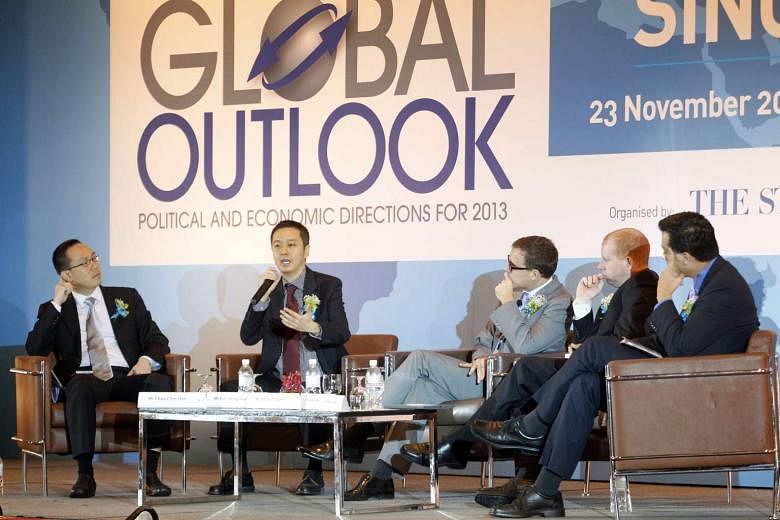Despite the bleak forecasts for US-China ties, Asean's credibility and Europe's unity held by many, Professor Tommy Koh has an optimistic view of the global situation.
The ambassador-at-large believes that the world's two biggest powers will live in peace, the regional bloc will continue to be relevant, and the European Union will survive its financial crisis. "My prognosis for 2013 is that it will be a more peaceful and prosperous year than 2012," he said in his keynote speech at a Straits Times forum yesterday.
It was an optimism that the veteran diplomat maintained as he joined several economists and the newspaper's foreign correspondents in giving their take on the global outlook for next year.
The Straits Times Global Outlook forum, which was organised by ST and Standard Chartered Bank, was held at the Mandarin Orchard hotel, and drew more than 350 ST readers.
It featured ST's US Bureau chief Chua Chin Hon, China Bureau chief Peh Shing Huei, Europe Bureau chief Jonathan Eyal, supervising money editor and news editor Ignatius Low, and StanChart's head of Greater China research Stephen Green and chief investment strategist of the wealth management division Steve Brice.
They took turns to give their views on recent developments, from leadership changes in the US and China to forecasts for Singapore. They also took questions from participants.
In his keynote speech, Prof Koh took pains to explain his optimism - though he also qualified himself at one point by adding with a grin: "You have to discount some of the things I say, because I am a natural-born optimist."
On US-China relations, he noted that the two superpowers were too economically inter-dependent not to co-exist in peace.
As for Asean, he said leaders had reaffirmed their commitment to the bloc's unity and centrality at the latest summit,and also adopted a declaration on human rights. He believed that the regional bloc would succeed in its goal to build an Asean community and form a single market, because its members know the need to be united.
And he noted the determination by European leaders to keep their integration project on track, while also expressing confidence that China-Japan tensions would not get out of hand.
But Prof Koh was also circumspect in his assessments of Asia, noting that the region had to tackle many challenges, from poverty and illiteracy to rising income gaps.
ST's journalists were a little less sanguine than Prof Koh, noting an increasing pessimism in the regions they cover.
Mr Chua, for example, said he found American public opinion towards China worsening. "Even among elites in the China policy circle in the US, there is a striking pessimism about where the relationship is going," he said.
Mr Eyal too described a European Union that had a "50-50" chance. While it had not cracked up yet, it faced many challenges to reform its economy and welfare state.
ST reader K.L. Tan, who runs a company marketing industrial products, said the forum offered useful insight into the region, and suggested even deeper coverage.
"Perhaps it could be a full-day event and go more into the Asean nations," he said.

